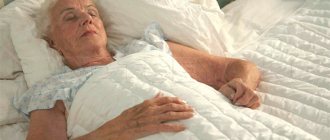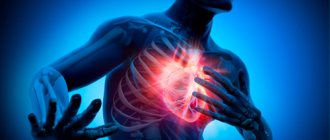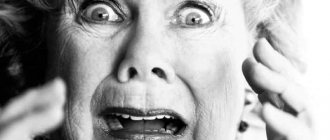With age, all natural processes in the body gradually fade away, and the work of the brain, unfortunately, is no exception. Relatives may notice that an elderly relative is gradually losing basic everyday skills, suffers from forgetfulness, and commits illogical actions - these are signs of developing dementia, an irreversible process that crosses out all neural connections. Living next to a person with dementia is a heavy burden: the family can only come to terms with the incurable disease and try to provide the patient with the most comfortable living conditions.
Vascular dementia disease
It is not difficult to understand that the disease vascular dementia is caused by persistent damage to the large and small vessels of the brain. This is due to impaired blood supply to the cortical-subcortical structures of the brain. The disease significantly affects a person's cognitive function. It destroys his social and professional skills, does not allow the patient to work normally and communicate with people around him. Many patients have impaired motor function and, over time, significantly lose self-care skills.
This disease most often affects elderly people over 65 years of age. But science knows of cases where vascular dementia was diagnosed in younger people. In addition to the main cause of the disease indicated above, it can also be caused by other factors, such as diseases and injuries of the brain and its tissues.
In this regard, experts identify such forms of this disease as:
- With an acute onset, which begins soon after serious damage to the brain and its blood vessels.
- The multi-infarction form develops some time after damage to the large and medium vessels of the brain.
- The subcortical form is a progressive dementia caused by persistent lesions of the small vessels of the brain.
- A combined form that appears with serious damage to the cortex and subcortical structures of the brain.
Essence of the disease
Dementia is characterized as an ever-increasing mental health disorder that leads to dementia. Pathology occurs when some part of the brain is damaged, which is why various head injuries often lead to its formation.
Typical for older people
- in such cases it is called senile. The danger of senile dementia is that it is much more difficult to correct disorders in the brain of an elderly person than a young person.
The degree of manifestation of symptoms depends on what stage the process is at. Changes occur in the patient's condition: from a simple decrease in concentration and dulling of mental activity to the complete collapse of personality and the impossibility of independent existence.
Symptoms of dementia include the following:
Advertising:
- mental abilities deteriorate to varying degrees;
- a person loses previously acquired knowledge;
- skills and abilities are forgotten, difficulties arise with long-practiced actions;
- brain cells are irreversibly damaged.
Whatever the stage of the disease development process, it cannot be completely reversible. It is important to provide the patient with care and the most comfortable conditions possible - this will reduce the amount of stress and reduce the intensity of dementia.
Polyneuropathy of the upper and lower extremities, the symptoms and treatment of which depend on many factors, is a pathology of the peripheral nervous system. With such a lesion, sensory and motor disturbances occur. Read more in the article: “polyneuropathy of the extremities - symptoms and treatment.”
Symptoms of vascular dementia
Since this disease primarily affects a person's psyche and his ability to maintain social and professional functions, the main symptoms of vascular dementia usually indicate a violation of this function. Such patients may laugh or cry for no reason, as well as show other emotions that are inappropriate to the place and circumstances. They may have all sorts of speech disorders. People begin to speak unclearly and, often, in a very nasal voice. Many words and letters may be replaced by others or may sound incomprehensible to others. Patients are often practically devoid of facial expressions and active expression of emotions. Their true mood sometimes becomes incomprehensible to others.
A manifestation of this disease can also be an unclear and unsteady gait, due to which patients become susceptible to falls and injuries even when walking on a flat surface. With dementia, hand tremors are often observed, and habitual physical actions become slow and unclear. Patients may experience involuntary movements of the lips, eyes, arms or legs. In addition, this diagnosis is often characterized by a violation of pelvic functions, one of the common manifestations of which is involuntary urination.
Some other signs may also indicate dementia. But at the same time, many of them are uncharacteristic and can be symptoms of many different mental and other diseases.
Non-drug treatment
In addition to medications, a patient with senile dementia may benefit from:
- Cognitive trainings that involve reading books together, reproducing them, and discussing them. Elderly patients memorize poems and study using special cards. It is important to practice daily, as there is a chance that everything you learn will be quickly forgotten.
- Biographical trainings, the purpose of which is to maintain memories that are erased from memory. During these classes, events that happened in the past are discussed, old photographs are viewed, and retro music is listened to.
- Keeping a diary in which events are recorded. It helps train thinking, helps relieve excessive emotional tension and eliminate negative experiences.
- Physical activity, including sets of exercises, as well as walks in the fresh air.
- Art therapy, music therapy, pet therapy aimed at solving educational, developmental and therapeutic problems.
Stages of vascular dementia
Psychiatrists usually distinguish three stages of vascular dementia:
- Early, which can be almost invisible to others. At this stage, patients have only slightly impaired social and professional skills. In addition, they forget certain events, but do not suffer significant memory loss. Patients may have unstable mood and increased anxiety.
- Average. At this stage, there is significant impairment of memory and social skills. People are practically unable to practice their profession, and their communication with others is significantly hampered. At the same time, patients may not even recognize their relatives and well-known people. They often get lost even close to home and forget where their things and objects are. Many people are practically unable to take care of themselves. Their need for service and assistance from third parties is growing rapidly.
- Late - the person is almost completely dependent on outside help. He is almost unable to navigate space and communicate in society. Such patients cannot take care of themselves and do not recognize their relatives and friends. Their speech often becomes incoherent and incomprehensible. People suffering from this stage of vascular dementia experience visual and other hallucinations. The patient's personality and character completely changes according to the principle of degradation. He hardly takes care of himself and does not strive to maintain personal hygiene. Despite the fact that most people at this stage of the disease have significant impairments in motor and physical activity, many of them leave home and begin to wander. Such people often become victims of traffic accidents and other accidents.
Aggression in dementia
Experts often say that people with dementia live in their own universe. They have their own rules and laws. Often a calm, balanced person throughout his life becomes embittered and aggressive under the influence of the disease. It is strictly forbidden to leave small children in the same room with elderly people suffering from dementia. They are not aware of their actions and can harm a child who is unable to defend himself.
The most surprising thing is that aggression can appear suddenly; at any moment, loved ones must be prepared for an outbreak. Patients make scandals, rush into fights, throw objects, break dishes, may bite, pinch or grab
the hair of the person nearby. It is very difficult for loved ones to maintain emotional contact with such patients. All attachments and feelings for a loved one are erased under the influence of constant inappropriate behavior. What to do with aggression in senile dementia, and how to explain to neighbors that no one is bullying an elderly relative?
First of all, you need to remember that aggression can be a signal of some kind of discomfort that the patient is experiencing. These could be problems with physical well-being, psychological trauma, or everyday inconveniences. A man screams and fights to get attention. Anger often manifests itself while taking medications. In this case, you need to consult your doctor and discuss the possibility of replacing the drug with an analogue.
As for neighbors, there is no need to hide the diagnosis of a loved one from them. During walks or short visits, they themselves will be able to assess the patient’s condition and understand that relatives are not mocking him, but are themselves victims of his inadequate condition.
Basic rules of behavior when a patient has an outburst of anger:
- Don't show fear;
- Take a step back (move away as much as possible, but so as to see the patient);
- Listen and try to calmly console;
- Transfer his attention to another issue;
- Do not respond with anger and do not punish the patient.
There is no need to keep negativity to yourself. If there is someone who is able to listen and give advice, it is better to call such a person and talk it out. Internal tension that does not find relief will lead to problems of a psychosomatic nature.
Diagnosis of vascular dementia
Diagnosing this disease at an early stage is quite difficult. Indeed, at this moment, its symptoms can be almost invisible. There are also cases when the diagnosis of vascular dementia is complicated by the fact that the disease disguises itself as other diseases. However, most people who get sick usually do not realize that they are sick. Therefore, the concern for establishing this diagnosis in most cases falls on the shoulders of the patient’s relatives, who must promptly notice changes in his behavior and usual way of life.
When a disease is suspected, diagnosis most often begins with a visit to a general practitioner, who must rule out the presence of other diseases and refer the person for examination by a neurologist and psychiatrist. In this case, a neurologist, using special studies, determines the condition of the brain and its cortex, as well as blood vessels. It is very important at this stage to correctly identify vascular changes typical of dementia. Also taken into account are the external manifestations of the disease, expressed in changes in behavior, social functions, disruption of professional activities, speech, motor activity and other skills and functions.
A psychiatrist can confirm the presence of dementia based on research and analysis of behavioral disorders. Despite the negative attitude towards such specialists that has developed over the years in Russian society, contacting them in this case should be immediate in order to avoid even more unpleasant consequences.
Organization of patients' everyday life
If doctors have diagnosed a patient with dementia, his relatives should specially arrange rooms for the patient to live.
You need to put locks in them, leave a minimum number of things and furniture, and remove sharp and cutting objects. Most people with dementia exhibit aggression and a tendency to vandalism. They can harm themselves and others. To prevent the patient from throwing away or destroying money and documents, they should be removed from the room and hidden. Psychotherapists believe that a patient with dementia should be told about the disease and explained what awaits him in the distant future. This allows a person to resolve everyday issues in a timely manner: make a will, realize an old dream. In the early stages of the disease, patients take part in discussions about the treatment program. If things are left unsaid, a tense situation, worry, and anxiety arise in the family, which negatively affects not only the patients, but also their loved ones.
A patient suffering from dementia will never be able to appreciate the actions of a caregiver or show gratitude. There is no need to be offended by him about this, just as we are not offended by small children. Dementia does not necessarily progress to the third stage of the disease. In many cases, severe memory impairment can be prevented with adequate therapy. Some memory disorders are reversible. Sometimes, through the joint efforts of doctors and people caring for a patient, it is possible to partially restore impaired functions and improve the quality of life. Neurologists, psychotherapists and rehabilitation specialists at the Yusupov Hospital together create an individual treatment program for each patient. This guarantees the maximum effect of the therapy. Doctors at the neurology clinic constantly monitor patients and, if indicated, change medications, their doses, and the regimen of use.
To provide your loved one with adequate medical care and professional care if dementia develops, call the contact center at any time of the day, regardless of the day of the week. Our specialists will select a convenient time for consultation with a neurologist who specializes in the diagnosis and treatment of memory disorders.
Diagnosis of vascular dementia
The diagnosis of vascular dementia can be made by a psychiatrist or neurologist based on research and examination of the patient. Also, the stage of the disease can be identified and its treatment can be selected, aimed at reducing negative manifestations and reducing progression.
This diagnosis often becomes the cause of disability and incapacity in old age. Such patients require constant care in many cases. If it is impossible to provide it to relatives and friends, caregivers may be appointed by specialists from social authorities. In addition, many people with this disease are placed for long-term treatment in psychiatric clinics.
Types of dementia in old age
According to the etiological factor, dementia can be:
- vascular,
- atrophic,
- mixed.
Depending on where the lesion is located, the following types of dementia in the elderly are distinguished:
- cortical (in the cortical centers of the brain);
- subcortical (basal ganglia, white matter, limbic system, etc.);
- cortical-subcortical;
- multifocal, accompanied by many foci of brain tissue damage.
Syndromic classification divides dementia into:
- total (changes are rough, pronounced);
- lacunar, or dysmnestic (occurs with milder symptoms).
Pseudodementia is distinguished separately. In this condition, cognitive functions sharply deteriorate due to existing psychiatric pathology (hysteroid psychopathy, depressive disorders).
Stages of development of vascular dementia
This disease is characterized by stage-by-stage development. In most cases it develops relatively slowly. The disease may progress over several years. But sometimes doctors are faced with a fairly rapid development of the disease. But regardless of this, it is always possible to trace three stages of the development of vascular dementia.
- Mild, in which the signs of the disease are almost invisible. At this stage, patients remember worse important events, the names of their family and friends, planned activities and other events.
- Moderate. At this stage, the manifestations of the disease become more noticeable, but most often only the patient’s relatives and friends can see them. After all, these signs are incomprehensible to most people around, since the patient has mild memory loss, loss of professional skills, decreased social function and other problems that can often be attributed to character traits.
- Heavy. At this stage, the manifestations of the disease are very noticeable even to people unfamiliar with the disease and non-specialists. The patient needs constant assistance from third parties. He practically cannot navigate even in the home space familiar to him; there are serious deviations in behavior, disturbances in speech, memory, gait, and much more.
Despite the presence of obvious signs of dementia, diagnosis can only be made by a doctor on the basis of special studies indicating changes in brain tissue and blood vessels characteristic of this disease. After all, many of these symptoms can also be a manifestation of other diseases or mental conditions. Since this diagnosis is most common in older people over 65 years of age, these patients should be tested for its presence. But there are cases when this disease is diagnosed in younger people.
Consequences of senile dementia
The development of dementia in old age leads to the following:
- Loss of self-care skills.
- Threat of emergency situations (fire, gas leak, flooding, etc.).
- Risk of injury to the patient.
- The likelihood of bedsores forming, as well as their infection (if the patient is immobilized).
- Exhaustion and dehydration of the body.
- Aggressive behavior towards other people, self-aggression.
- Mental disorders, manifested in the form of delusions, hallucinosis, etc.
We recommend
“Caring for older people with dementia: learning to build relationships” Read more
Drugs for the treatment of vascular dementia
When treating this disease, medications for concomitant diseases must be prescribed. Blood thinners, such as ThromboAce, are also often prescribed. Patients are prescribed vasoactive drugs, such as vinpocetine and the like, aimed at dilating the blood vessels of the brain and heart. In addition, other drugs that affect the state of the nervous system, brain, heart and blood vessels may be prescribed.
Drugs for the treatment of vascular dementia must necessarily include nootropics. Medicines from this group support and improve brain structures. Taking medications such as piracetam or Cerebrolysin may slightly increase brain activity. They are also sometimes able to slightly improve and prevent memory, spatial orientation and other social functions from rapidly deteriorating. In some cases, such treatment can maintain some professional and intellectual functions at a completely stable level for a long time, which allows patients not only to be almost full members of society and take care of themselves, but even to work in some simple jobs. True, this is possible only in the initial stages of the disease in the absence of its significant manifestations.
Doctors treating vascular dementia must also prescribe medications that relieve dangerous symptoms and manifestations of the disease. Most often, patients are prescribed treatment for depression, unreasonable aggression and insomnia. It is important to remember that such medications have many side effects. Therefore, their use should be strictly controlled by specialists based on tests and other studies, as well as an assessment of the patient’s general condition.
How is senile dementia diagnosed?
The diagnosis is made in the presence of symptoms of dementia, expressed in deterioration of memory and cognitive functions, loss of control over one’s impulses and emotions. The disease is also confirmed by the results of EEG, CT and neurological examination.
The condition for correct diagnosis is clarity of consciousness, absence of confusion, confusion and delirium. If social maladjustment of an elderly person is observed for six months, his attention, thinking, and memory are impaired, then a diagnosis is made based on the ICD-10 criterion.
The diagnostic process takes into account intellectual-mnestic disorders, loss of skills and abilities that manifest themselves directly in everyday life and at work.
Depending on the general clinical picture, several types of dementia are distinguished:
- dysmnestic (partial dementia);
- diffuse (total dementia);
- lacunar (partial changes).
Depending on the nature of its course, dementia can be pseudo-organic, organic, post-apolexic, post-traumatic, etc.
Dementia can manifest itself in Pick's disease, Alzheimer's disease, cerebrovascular pathology, exogenous and endogenous intoxication of a chronic type. It can also be a complication due to a cerebrovascular disease, general intoxication, or degenerative or traumatic brain damage.
Forecast
Dementia is an inevitably progressive pathology. However, with proper care and drug treatment, you can live with it. Life expectancy depends, first of all, on the etiological factor against which mental changes occurred, as well as concomitant diseases.
With some forms of dementia, people live for 5 years, with others – 10. There is also a form with a favorable life prognosis. To assess the degree of brain dysfunction in various types of dementia, doctors conduct a comprehensive examination.
You can slow down the development of dementia by carefully monitoring your health, regularly measuring your blood pressure, visiting a specialist for preventive examinations, eating right and leading an active lifestyle.
Features of caring for an elderly person with late-stage dementia
Dementia deprives a person of independence and the ability to care for himself. As a result, all the troubles are entrusted to close relatives. Proper organization of home care for patients will help bring harmony to relationships.
Dementia is often accompanied by changes in the central nervous system, which lead to paralysis, decreased muscle strength, etc. As a result, the person becomes immobile.
A bedridden patient is at high risk of developing problems associated with prolonged stay in one position. These include:
- diaper rash and bedsores;
- disruption of the functioning of the intestines, organs of the cardiovascular and respiratory systems;
- difficulty in joint mobility;
- change in coordination.
Prevention of diaper rash involves regular skin care. You should pay special attention to the skin in the folds while bathing. It is there that it is warm and humid, which predisposes bacteria to multiply. It is important to promptly wash the elderly after each bowel movement and change the diaper.
Bedsores - skin ulcers, entry points for infection - occur in places of greatest pressure (back of the head, elbows, heels, buttocks, etc.). The following rules will help you avoid their occurrence:
- Once every 2-3 hours it is necessary to turn the person from one side to the other. If the condition allows, sit on a chair or wheelchair;
- treat the skin in areas where bedsores are likely to form with a suitable care product;
- avoid getting clothes, bed linen wet, or accumulating food crumbs;
- perform a light massage that stimulates blood circulation;
- Monitor your diet and drink the right amount of water.
Catering requires special attention. When choosing food, you should adhere to the following recommendations:
- the food offered should be familiar, without new unusual dishes that may not be to your taste;
- food should not be too hard or cause problems with swallowing;
- High fiber foods will help avoid intestinal problems;
- dishes should be easily digestible and not contain a lot of salt;
- It is advisable to eat food at the same time at regular intervals.











